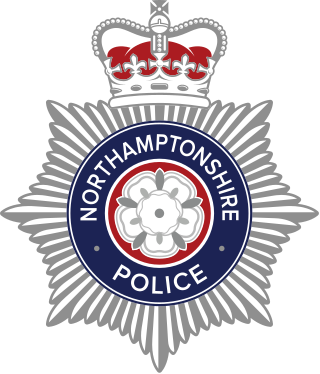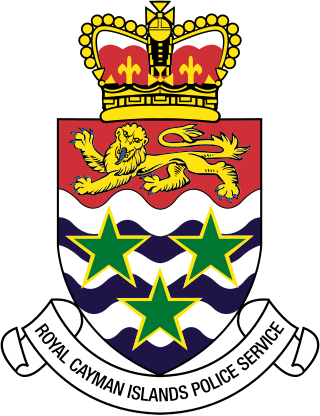The Criminal Investigation Department (CID) is the branch of a police force to which most plainclothes detectives belong in the United Kingdom and many Commonwealth nations. A force's CID is distinct from its Special Branch. The name derives from the CID of the Metropolitan Police, formed on 8 April 1878 by C. E. Howard Vincent as a re-formation of its Detective Branch. British colonial police forces all over the world adopted the terminology developed in the UK in the 19th and early 20th centuries, and later the police forces of those countries often retained it after independence. English-language media often use "CID" as a translation to refer to comparable organisations in other countries.
Police ranks are a system of hierarchical relationships in police organisations. The rank system defines authority and responsibility in a police organisation, and affects the culture within the police force. Usually, uniforms denote the bearer's rank by particular insignia affixed to the uniforms.
Inspector, also police inspector or inspector of police, is a police rank. The rank or position varies in seniority depending on the organization that uses it.

The Zimbabwe Republic Police (ZRP) is the national police force of Zimbabwe, having succeeded the British South Africa Police on 1 August 1980.

ACT Policing is the portfolio of the Australian Federal Police (AFP) responsible for providing policing services to the Australian Capital Territory (ACT). The Australian Capital Territory Police was an independent police force responsible for policing the ACT until 19 October 1979, when it was merged with the Commonwealth Police to form the AFP.

Northamptonshire Police is the territorial police force responsible for policing the county of Northamptonshire in the East Midlands of England, in the United Kingdom.
Superintendent (Supt) is a rank in the British police and in most English-speaking Commonwealth nations. In many Commonwealth countries, the full version is superintendent of police (SP). The rank is also used in most British Overseas Territories and in many former British colonies. In some countries, such as Italy, the rank of superintendent is a lower rank.

The Royal Cayman Islands Police Service (RCIPS) is the standing police force of the British Overseas Territory of the Cayman Islands. The police force was formed in 1907 and currently (2009) stands at 343 enlisted officers, tasked with tackling Crime in the Cayman Islands.

Sir Robert Mark was a senior British police officer who served as Chief Constable of Leicester City Police, and later as Commissioner of the Metropolitan Police from 1972 to 1977.

The Ghana Police Service is the main law enforcement agency in Ghana. It is organized at national level and has a unitary command under the Inspector General of Police (IGP). Although there are many regional and divisional commands, they all report to the National Headquarters in Accra.

Sri Lanka Police is the civilian national police force of the Democratic Socialist Republic of Sri Lanka. The police force is responsible for enforcing criminal and traffic law, enhancing public safety, maintaining order and keeping the peace throughout Sri Lanka. The police force consists of 43 Territorial Divisions, 67 Functional Divisions, 432 Police Stations with more than 84,000 people. The professional head of the police is the Inspector General of Police who reports to the Minister of Law and Order as well as the National Police Commission. The current Inspector General of Police (Acting) is Deshabandu Tennakoon.
The Paedophile Unit is a branch of the Metropolitan Police Service's Child Abuse Investigation Command, based at Scotland Yard in London, England. It operates against the manufacture and distribution of child pornography, online child grooming, and "predatory paedophiles online", and organised crime associated with these.
The New Year Honours 1988 were appointments by most of the Commonwealth realms of Queen Elizabeth II to various orders and honours to reward and highlight good works by citizens of those countries, and honorary ones to citizens of other countries. They were announced on 31 December 1987 to celebrate the year passed and mark the beginning of 1988 in the United Kingdom, Australia, New Zealand, Mauritius, the Bahamas, Grenada, Papua New Guinea, the Solomon Islands, Saint Lucia, Saint Vincent and the Grenadines, Belize, Antigua and Barbuda, and Gibraltar.
Queen's Birthday Honours are announced on or around the date of the Queen's Official Birthday in Australia, Canada, New Zealand and the United Kingdom. The dates vary, both from year to year and from country to country. All are published in supplements to the London Gazette and many are conferred by the monarch some time after the date of the announcement, particularly for those service people on active duty.
The New Year Honours 1986 were appointments by most of the Commonwealth realms of Queen Elizabeth II to various orders and honours to reward and highlight good works by citizens of those countries, and honorary ones to citizens of other countries. They were announced on 30 December 1985 to celebrate the year passed and mark the beginning of 1986 in the United Kingdom, New Zealand, Mauritius, Fiji, the Bahamas, Grenada, Papua New Guinea, the Solomon Islands, Saint Lucia, Saint Vincent and the Grenadines, Belize, Antigua and Barbuda, and Saint Christopher and Nevis.
The 1932 New Year Honours were appointments by King George V to various orders and honours to reward and highlight good works by citizens of the United Kingdom and British Empire. They were announced on 29 December 1931.

The Royal Turks and Caicos Islands Police Force is the national police force of the Turks and Caicos Islands, a British Overseas Territory in the Lucayan Archipelago of the Atlantic Ocean and northern West Indies. It is one of the oldest police forces in the world.
The 1967 New Year Honours in New Zealand were appointments by Elizabeth II on the advice of the New Zealand government to various orders and honours to reward and highlight good works by New Zealanders. The awards celebrated the passing of 1966 and the beginning of 1967, and were announced on 1 January 1967.
The police in Canada's ranks differ according to the different police forces and depend on different laws at the federal, provincial, and municipal levels.

















